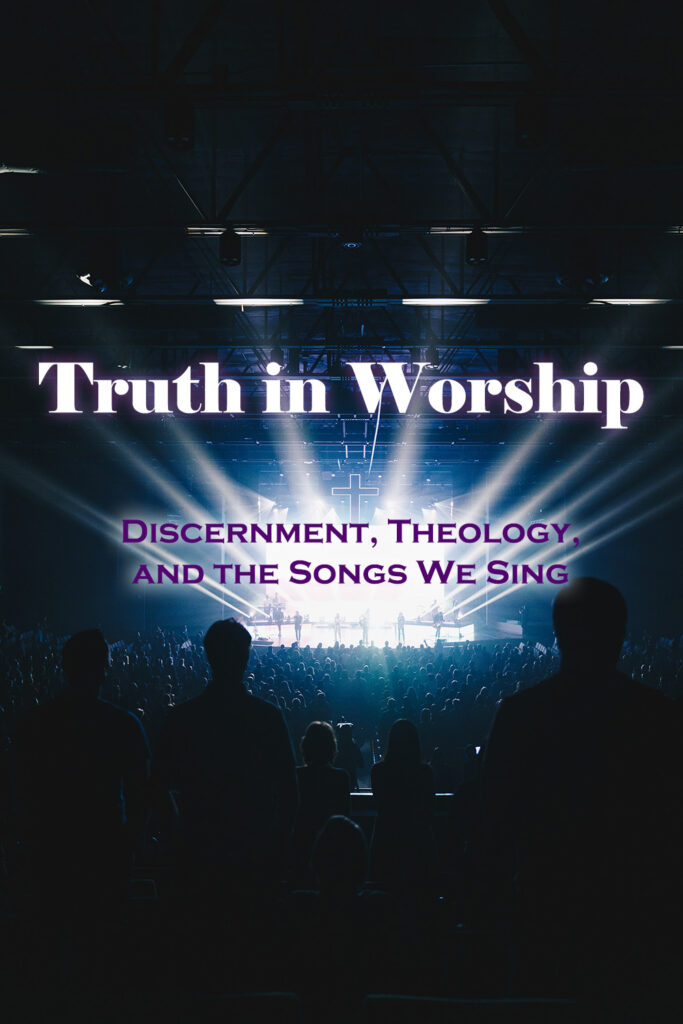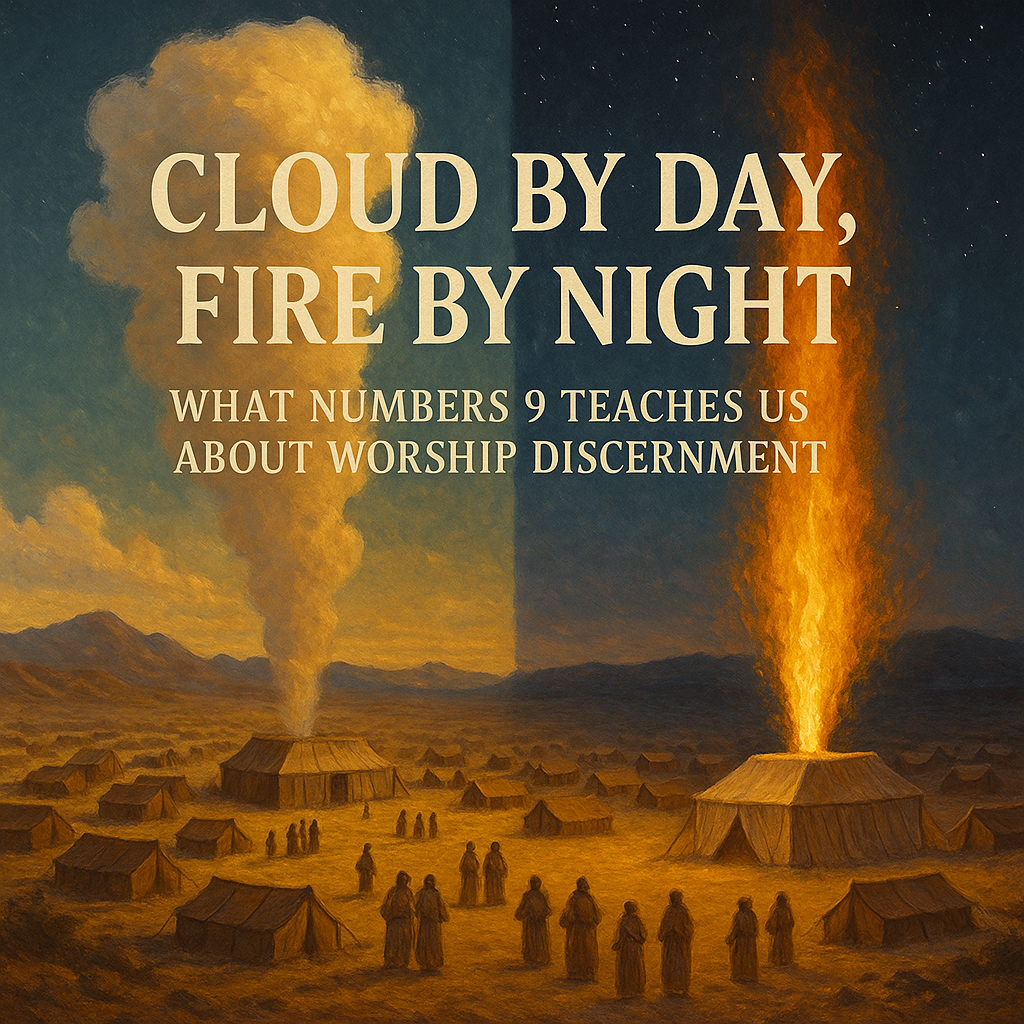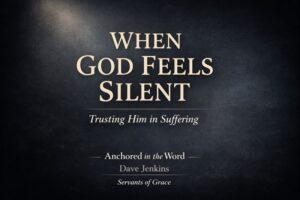⏱️ Estimated Reading Time: 8 min read
Cloud by Day, Fire by Night: What Numbers 9 Teaches Us About Worship Discernment
By Dave Jenkins
Worship today is often shaped by trends, technology, and emotional experience. For many churches, the measure of good worship is how engaging or moving it feels. But Scripture paints a different picture. Worship is not primarily about our preferences, our musical style, or our emotional response, it’s about God’s glory and our response to Him in truth.
In Numbers 9, we find one of the most overlooked yet powerful passages on worship discernment in the entire Old Testament. As the Israelites camped in the wilderness, the Lord Himself led them through a cloud by day and a pilar of fire by night. Their movements, their rhythms, and their worship were entirely governed by the visible presence of God. They didn’t move unless the cloud (or fire) moved. They didn’t stay unless God said to stay. They followed the Lord, not because it was efficient or exciting, but because He was holy.
As we examine this chapter, we’ll see why worship must be directed by God’s Word, how obedience matters more than innovation, and why discernment in worship is urgently needed today. We’ll explore the text, trace its fulfillment in Christ, connect it to Church history, and end with practical steps to cultivate discernment in the worship life of the Church.
Worship Must Follow God’s Direction (vv. 15–18)
“At the command of the Lord the people of Israel set out, and at the command of the Lord they camped” (Numbers 9:18).
The cloud that covered the tabernacle symbolized the presence of God. When it lifted, the people broke camp and followed. When it settled, they waited. Their lives and worship were tied to God’s movement and timing. There was no schedule, no predictability—just obedience.
In our day, worship is often engineered for consistency and engagement. Churches build services around what attracts the most people or creates the strongest responses. But Israel didn’t have the luxury of programming their journey; they had to watch, wait, and move at God’s command.
We are not free to define or schedule worship according to our preferences. True worship starts with submission to God’s revealed will. The Church must return to watching the “cloud” of God’s Word, not the smoke machines of modern emotionalism. Discernment check: is our worship shaped more by the presence of God or the performance of people? This question isn’t theoretical—it’s pastoral. Are our services led by faithful shepherds responding to Scripture, or by stage designers optimizing for response metrics? Israel moved by watching the cloud. Are we watching the Word?
God’s Commands Override Human Expectations (vv. 1–14)
In verses 1–5, God commands the people to keep the Passover, but then a problem arises. Some men are ceremonially unclean due to contact with a corpse and can’t participate in the feast. What happens next is instructive. Moses doesn’t invent a solution; he inquires of the Lord. And God responds with clarity—providing a merciful, regulated exception that preserves both holiness and inclusion. He even includes foreigners, provided they submit to His commands.
Moses models what faithful spiritual leadership looks like. In a moment of tension, he doesn’t react with pragmatism—he seeks the Word of the Lord. In contrast, many modern leaders modify worship practices based on what draws a crowd or feels authentic. But the truth of the matter is that discernment means slowing down and going upward before going forward.
When worship leaders face questions about song choice, liturgy, or platform culture, they must do what Moses did: ask, “What has God said?” We don’t need cultural creativity. We need biblical clarity.
Obedience in Worship Isn’t Optional (vv. 19–23)
“Whether it was two days, or a month, or a longer time… they remained… and did not set out” (Numbers 9:22).
Sometimes the cloud stayed over the tabernacle for a day; other times it remained for a month. The people had to be ready at all times to either stay or move. This required patience, trust, and obedience.
Today’s worship culture prizes immediacy and stimulation. We want predictable formats, impressive experiences, and fast spiritual results. But Israel learned to live in submission to God’s presence—even when it meant waiting without clarity.
Biblical worship requires humility. Discernment means resisting the urge to manufacture movement when God has called us to wait. In many churches, worship has become performance-driven rather than presence-centered. The question is no longer, “What pleases God?” but “What gets people excited?” Faithful worshipers don’t rush ahead of God’s Word; they wait, trust, and follow. Obedience in worship isn’t always glamorous, but it is godly. And in a culture of constant innovation, faithful waiting can be the most countercultural act of worship.
The Cloud and the Cross: How Numbers 9 Points to Christ
The tabernacle, the cloud, and the pilar of fire were not just wilderness tools—they pointed forward to something greater. Ultimately, they pointed to Christ Himself. John 1:14 says, “The Word became flesh and dwelt among us.” The Greek word for “dwelt” literally means “tabernacled.” Jesus is the fulfillment of what the tabernacle represented—God with us.
In the wilderness, the people followed the cloud. In the New Covenant, we follow the Son of God, led by His Spirit and Word. He is our true High Priest, our once-for-all sacrifice, and the One who leads us into the true Promised Land.
“Long ago, at many times and in many ways, God spoke to our fathers by the prophets, but in these last days He has spoken to us by His Son” (Hebrews 1:1–2). The cloud and the pilar of fire led the people externally. Today, Christ leads His Church by the internal Witness of His Spirit, through the external authority of Scripture. If worship is not Christ-centered and Word-shaped, it is not Christian worship.
The modern Church must ask: are we following the presence of Christ revealed in Scripture, or the sensations of the moment? If the cloud pointed to Christ, then worship that ignores Christ is a worship that has already lost the way.
Calvin, Burroughs, and Reverent Worship
John Calvin taught that worship must be governed by the revealed will of God. His concern was not merely theological but pastoral. He believed human inventions in worship clouded the glory of Christ. Indeed, Calvin once said, “God disapproves of all modes of worship not expressly sanctioned by His Word.”
Jeremiah Burroughs, a Puritan pastor, warned against what he called “will-worship”—worship built on human preference. In his book Gospel Worship, Burroughs wrote, “The reason why we worship God in a careless manner is because we do not see God in worship.”
Hughes Oliphant Old, a noted historian of Reformed worship, observed that true worship is always both biblical and historic. Worship not rooted in either quickly becomes shallow.
5 Marks of Worship Discernment
The Reformers and Puritans saw worship not as a playground for creativity but as holy ground. Their writings on the subject can help guide our understanding of the five marks of worship discernment.
- Scripture-Regulated: Every element—songs, prayers, readings, preaching—should be grounded in the Word.
- Christ-Centered: Worship must exalt Christ, not personalities or performers.
- Spirit-Enabled: Discernment flows from the Spirit working through the Word—not emotion detached from truth.
- Congregation-Focused: Worship is for the building up of the Church, not individual entertainment.
- Reverent and Joyful: Awe and joy are not opposites—they meet in the presence of a holy God.
Pastors must lead their people in a culture of discernment, patiently teaching them to evaluate everything by Scripture. Worship leaders must submit their artistry to God’s Word. And all Christians must reject the temptation to treat worship as an experience to consume rather than a response to God’s glory. We don’t need novelty—we need reverence. We don’t need creativity—we need clarity. And we don’t need production—we need submission.
Closing Reflection: Waiting for the Cloud, Following the Cross
The history of God’s people given in Numbers 9 isn’t just about ancient Israel’s obedience—it’s about the posture of the people of God in every generation. Today, many churches have replaced the “cloud” of God’s presence with fog machines. But the Church must reclaim a vision of worship where we don’t move until God speaks—and when He speaks, we move in obedience.
One of the reasons the Puritans left England for the New World was to worship God in freedom and fidelity. They brought the Geneva Bible and the conviction that worship belonged to God alone. They sailed not for preference, but for principle. Let us follow in their footsteps. Let us fix our eyes on Christ. Let us worship according to His Word. And let us never forget: worship is not where we get creative—it’s where we get humble before the Lord.
“Let us offer to God acceptable worship, with reverence and awe, for our God is a consuming fire” (Hebrews 12:28–29).




